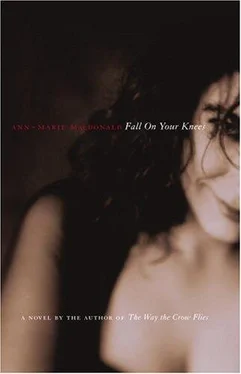She asks who her mother was and what became of her.
(Con effusione) “She died.”
“Oh Father, what great sorrow — quanto dolor — can cause such bitter tears?” But he can’t tell her anything, he loves her too much. So much that he keeps her locked up here —
“You must never go out.”
“I go out only to church.”
“Good.”
— so much that he’ll put her in a bag and stab her by mistake (Orror!) — but that comes later. For now:
“Quanto affetto! Quali cure!
che temete, padre mio?
Lassù in cielo presso Dio ,
veglia un angiol protettor….”
With the first notes a frisson runs through the house; hairs spring to attention on napes of necks; erectile tissues stir unbidden beneath pearl-studded shirt fronts and matronly bodices, and within the farthest folds of nuns’ habits. Two things can inspire such a shiver: a beautiful voice, and someone walking on your grave. But only the former can allow you to share the shiver with a packed house.
As the song takes wing, the Lyceum disappears and the heat melts away. James cannot suppress his tears. At first he’s self-conscious, then he notices other people are wiping their eyes. It’s nothing to do with the words, which are in a foreign language, or the story, which most people don’t know. It’s because a real and beautiful voice delicately rends the chest, discovers the heart, and holds it beating against a stainless edge until you long to be pierced utterly. For the voice is everything you do not remember. Everything you should not be able to live without and yet, tragically, do.
“… Da noi toglie le sventure
di mia madre il priego santo;
non fia mai divelto o franto
questo a voi diletto fior.”
The cavatina comes to an end, a simple song. There is a silence in the hall, full of the peace that can follow music and allow you to forget for a moment your mortal enemies, flesh and time.
The curtain falls. Applause. James releases Sister Saint Cecilia’s hand. “I’m sorry, sister.”
She smiles, testing discreetly the harmony of twenty-seven compressed bones.
The baritone in the hunchback suit waddles out and bows deeply with all the humility of haute ham but James pays him no mind — here she comes! The applause soars. “Brava!” cries the crowd, “Bravissima!” “Atta girl!” The audience rises to its feet. She curtsies, poised, dignified. James has never been so proud. For all his boyhood ambitions he never could have dreamt of this, of her, a gift of such magnificence. She belongs to the world, she’s almost gone, he knows that and does not begrudge it, he applauds with the rest. The baritone takes her hand, kisses it — foolish lardass, get out of the way — any second the stagehand will bring out the roses James has arranged, he can’t wait to see her face — she’s being pelted with daisies — James swivels in his chair, intending to spot the culprit, and instead looks straight into the eyes of his estranged mother-in-law. Teresa, the maid, sees the avid white face with the boy-blue eyes and bird-of-prey bones and wonders, who is he to be staring at Mrs Mahmoud?
Meantime, the boy who fired the daisies is running towards the stage, a black haired scallywag barely out of knickerbockers. The house is still applauding. James turns to the front to see the boy vault onto the stage and kiss his daughter on the cheek. An uproar, a laugh, more applause; the youth turns pink, drops to his knees, laughing, worshipping. She knights him with a daisy, James is on his way down the aisle, going to put a stop to this, when “Ladies and gentlemen, may I have your urgent attention, please!”
Clanging a handbell at the back of the hall, it’s grey Mr Foss, head of the Orpheus Society. James stops in his tracks halfway through the brass section. The roar of the crowd dies. All eyes are on Foss, who clears his narrow throat and, with a reedy dignity befitting hope and glory, announces, “The offices of The Sydney Post have just received a cable from the provincial parliament in Halifax. Today, Great Britain declared war on Germany. Canada will heed the call of the Mother Country in her hour of need. Ladies and gentlemen. We are at war.”
Two minutes of silence will come four years later, but for now it’s a dotted-quarter-note rest broken by the boy on stage, who springs to his feet con spirito , hurls three cheers into the air followed by a handful of petals. The Sydney Symphonette strikes up “God Save The King”. The audience sings. James reaches for the lip of the stage to steady it, for it’s suddenly gone a little lopsided.
Late that night, twelve hours into The War, Kathleen sits at her vanity, brushing her hair before the big oval looking-glass. She is not sleepy, how could she be? Tonight she sang. The world will never be the same.
Who is that in the glass? She sees herself for the first time. She doesn’t require soft light, not at her age, not with her looks, so the effect of three candles is excessively ravishing. Her hair sparks at every brush stroke. The candlelight carves a grotto in the gloom around her. The mirror is a sacred pool, in it she sees the future: her lips swollen with kissing, eyes caressing, come with me to my home beneath the sea and I will love you.
She unbuttons her nightgown. My beautiful throat. Bares a white shoulder, ohh. Parts the fabric to reveal her breasts, sailor take warning. Her image floating just beneath the twilight surface, tempting herself overboard.
She hovers her hand above a nipple that gathers and pleats to a point seeking heat. Kisses her palm with one eye on the mirror. Again, this time with her tongue. Experiments with the creation of cleavage. Arranges her hair: Gibson girl, milkmaid, madwoman, dryad. And leaves it there, spilling over her shoulders.
It’s a self-portrait and the artist is in love.
Her mother has warned her against gazing too long into a mirror. If you like too well what you see there, the devil will appear behind you. This has always worried Kathleen in spite of the fact she knows it to be nonsense, so she has never lingered. But tonight she feels brazen. Prepared to test the theory.
She smiles at herself. And gets stuck. Can’t move. Can’t look away or break the smile tightening to a grin on her face until she seems to be mocking herself. That’s when she sees him. Pete. In the shadows behind her. His smooth stuffed head. His hat. His no ears. His no face. She whimpers. Pete watches, Hello there . She can’t find her voice, is this a dream? In a wistful tone, Hello little girl . His no mouth, Hello .
She explodes from the sateen stool with a cry, flies blindly through the room, through Pete for all she knows, crashes out her door, across the hall, screaming like an incoming shell to the room where her father sleeps alone. She lands heavily on his bed sobbing, “I want to sleep with you tonight!”
He’s bolt upright, prepared to kill an intruder, but his fists turn to hands just in time to seize her shoulders. She’s shaking.
“Shshsh,” he says.
Carefully, through the darkness, he strokes her face. His thumb grazes her lips. “Hush now.” His hand slips round the warm back of her neck, “Hush my darling.” He kisses her cheek, the warm scent of her — he gets out of bed. Takes her briskly by the hand, “Come on, me old son,” quick march down to the kitchen, on with the electric light. In her cot, Materia is already awake. “A bad dream, that’s all, go back to sleep, missus.” Hot milk with honey, “That’ll fix you up, old buddy.”
Kathleen sips and calms down while he reads the paper and Materia stares at the yellowing linoleum. She’ll strip the wax tomorrow.
Читать дальше












